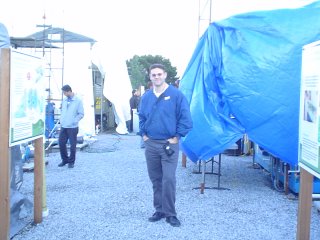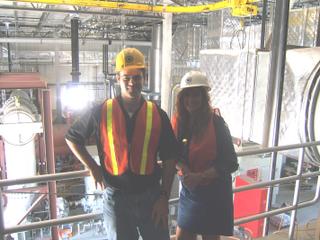You may have noticed that I have adjusted my aliyah target date. Instead of June 1st, at this point it makes more sense for me to aim for August 15th, which will give me a little bit of time after the PE exam to prepare myself, and the Ulpan I want to take doesn't begin until September anyway.
The biggest aliyah news so far is that the Sochnut (Jewish Agency) has approved my Tik Aliyah (application for Israeli citizenship.) Now, once I am ready to go, all I have to do is visit the Israeli consulate and have my passport stamped with an aliyah visa, which will entitle me to citizenship upon landing in Israel.
The next step is to begin the application process with Nefesh B’Nefesh (“Soul to Soul” in Hebrew,) an organization dedicated to helping Canadians and Americans make aliyah by, “removing the financial, professional, and logistical obstacles that are preventing many ‘would-be’ Olim from fulfilling their dream.” Nefesh B’Nefesh was founded by Rabbi Yehoshua Fass the day before the 9/11 attacks on the United States after his Israeli cousin was killed in a terrorist attack in Israel. He decided to honor his cousin’s memory by helping North Americans move to Israel as a response to those who would drive us out. He co-founded the organization with philanthropist Tony Gelbhart, and since then they have been steadily boosting the numbers of olim one year at a time.
The record number of immigrants from North America was 8,122 in 1971, part of a wave of immigrants inspired by Israel’s victory in the 1967 Six Day War. Since then, numbers have steadily dropped off until, even during the prosperity and quiet of 1999, only 1,697 North Americans decided to make aliyah.
Nefesh B’ Nefesh charters flights full of olim with El Al (Israel’s national airline,) bringing in immigrants by the planeload. The first flight was in 2002, only a couple of months after I had to leave Israel. That year Nefesh B’Nefesh assisted about 200 immigrants. The numbers have steadily increased until this year, 2005, saw six planeloads with 2,300 immigrants, and 10 planeloads are expected for 2006. The eventual goal is to break the all-time record of 1971 and beyond.
If the old saying that Zionism is one Jew sending a second Jew to Israel on a third Jew’s money, then Nefesh B’Nefesh is Zionism par excellence. Right now, my main concern is completing my application for financial aid. I have to gather together all of my financial records and have my accountant fill in a financial affidavit. Then I’ll write an essay explaining my plans and dreams for aliyah, hopefully inspiring them enough to help me out with my student loans. Nefesh B’Nefesh is also involved with helping immigrants work their way through the Israeli bureaucracy, find work, and generally get settled in life.
While I’m busy with aliyah business, the rest of life seems to be moving apace. I unfortunately sprained my ankle about two months ago while jogging. It was a class 2 inversion sprain, which means that there was incredible swelling, bruising, and I was stuck at home on crutches for several days. After a couple of weeks, I was able to use the exercise bike, and after a month, I was able to use the elliptical machine at the gym. Unfortunately, I still can’t run without serious pain, which makes it difficult to cross the street when the little “Walk” symbol changes to a “Don’t Walk”. I was hoping to be able to run again by January 1st, but it’s looking less and less likely.
I also had my first business trip a week ago. The company actually seems convinced that I’m some sort of HVAC (Heating, Ventilation, and Air Conditioning) guru, so they flew me up to Seattle and put me up in a hotel for a couple of days to help them with a project they’re doing up there. I managed to extend the trip through the weekend, so I had a chance to visit my friends, my Dad and Sister, and I met Ira and Terry, a couple of wonderful long-lost cousins who live near Seattle.
It was a fun trip, and great for the ego that the company thinks it’s worth $600 to fly me up to Seattle for my expertise. Now it’s back to the grind here in Walnut Creek, working 10 hours per day, 6 days per week as usual, trying to get out of debt and save up as much as possible.
Attached are some photos I took at a desalination pilot plant I visited earlier today.




